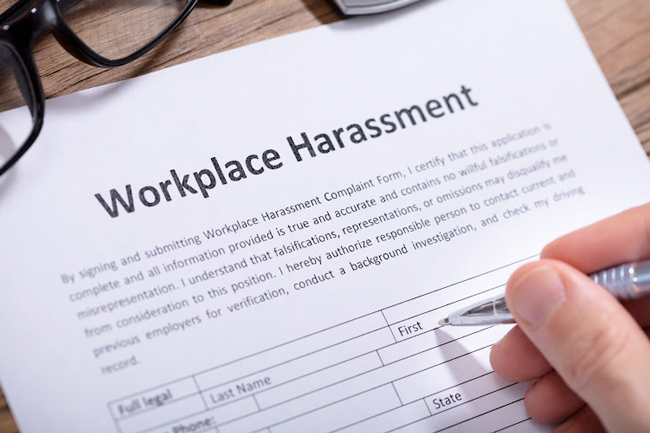It’s Now Easier To File A Complaint In Texas
Texas | Law | Employee | employer
Under two new Texas laws, even the smallest companies can be sued and complaints can cover harassment further in the past.
Sexually Harassed At Work? It’s Now Easier To File A Complaint In Texas
Under two new Texas laws, even the smallest companies can be sued and complaints can cover harassment further in the past.
Texas’ workplace sexual harassment laws are changing, giving employees more time to pursue a claim against a company.
The state’s rules will also now apply to many more businesses than they did before. While in the past, businesses with fewer than 15 employees were exempt from laws prohibiting sexual harassment, starting Wednesday, Sept. 1, the statute will apply to companies with at least one employee.
It could be a game-changer for both workers and small businesses.
‘That Is Isolation’
Imagine being a new employee at a very small company.
You’re sexually harassed by the owner, and there are few other coworkers to enlist as potential allies. That was what happened to a North Texas woman interviewed by KERA.
“That is isolation,” she said. “If everyone has their own office … they’re even more isolated. And that’s a great breeding ground for sexual harassment and assault.”
Her boss started with inappropriate comments, then escalated to sexual harassment, and, ultimately to sexual assault. The experience was traumatizing.
“I stopped going there, and I opened up a lot to my friends and family and they embraced me with open arms,” she said.
The woman spoke to KERA provided she remained anonymous. She’s still exploring her legal options.
One legal option she doesn’t have right now under Texas law is filing a sexual harassment claim with the Texas Workforce Commission against the company, a precursor to filing a lawsuit. That’s because her employer had fewer than 15 employees and was therefore exempt under state law.
“I was absolutely crushed,” the woman said, describing the moment she learned about the company size threshold. “I couldn’t believe that there was an exception for something like this.”
Her situation is not uncommon, according to Dallas attorney Javier Perez. He represents workers in cases like these (but not the woman in this story).
“I’d say I get a couple of those types of calls — where I can’t do something because of the size of the employer — maybe four, five times a month,” he said.
Once SB 45 goes into effect on Sept. 1, the threshold for sexual harassment claims drops in Texas. Companies with at least one employee can be held liable. Workers must still prove the harassment occurred.
New Responsibilities For Small Companies
Not only will SB 45 help employees seeking justice, it will force previously exempt employers to do more work to head off sexual harassment and avoid a costly lawsuit.
For example, many of these businesses don’t have human resources departments to set policy and organize trainings.
Plano employment attorney Ditty Bhatti said, in particular, the new laws could catch brand new companies off guard. Companies just getting off the ground are typically laser-focused on serving their customers and becoming financially sustainable.
“But this law, especially in Texas, makes it very important that employers focus on [sexual harassment policies] right from the beginning,” she said.
Among other changes, companies must now take “immediate and appropriate corrective action” if a supervisor knew or “should have known” about any sexual harassment.
Shannon Norris, a North Texas attorney who typically represents businesses, said management will have to put best practices in place.
“You need to train your managers to watch for things,” he said. “And just make it clear — if an employee has a problem, where do they go?”
Norris believes the requirement of “immediate and appropriate corrective action” begs the question: what is appropriate corrective action? Answering that should take a good deal of legal haggling in and out of court.
“Reasonable people can disagree about what’s reasonable. And unreasonable people certainly can,” he said.
Statute Of Limitations
Another change to Texas’ workplace sexual harassment rules is an increase in the time period covered by the law.
That law, HB 21, will give workers more time — 300 days after the incidence of harassment — to file a claim with the TWC. Other workplace complaints, such as racial or religious discrimination, must still be filed within 180 days of the alleged incident.
Perez said it often takes clients a while to become ready to pursue a claim and find a lawyer. Often, a worker has been fired or left a job before he or she seeks redress.
“Even if I filed a charge the day she comes to me, I can only reach back and address the prior six months,” he said of the old rules. “So if something happened seven months ago, there’s nothing I can do about that.”
Meanwhile, the North Texas worker in this story said she’s happy the state’s sexual harassment rules are changing to cover small businesses.
“Under these new laws, [people like me] will have more of a voice and more power and not be able to have … their livelihood held over their heads,” she said.
None of these changes will affect her case, though, because the new laws only apply for harassment that occurs on or after they take effect Wednesday. But she said it makes her feel better about the work world her future children will have.
also read :
New Changes To Sexual Harassment Laws
Texas has more than 650 new state laws going into effect September 1. As part of our ongoing look at new laws, today we’re highlighting how state workplace laws are changing. Texas employees filing sexual harassment claims will have more protections, and state sexual harassment rules now apply to many more businesses than they did before. KERA’s Bret Jaspers has more.
Protect employees against sexual harassment or face the consequences
Despite a comprehensive legal framework to deal with sexual harassment at work, it continues to run rampant in the workplac.
Businesses cannot turn a blind eye to sexual harassment allegations in the workplace.
They need to take proactive steps to protect employees and deal with any alleged instances of sexual harassment.
It’s clear that despite the existence of a comprehensive legal framework to deal with sexual harassment at work, this scourge continues to run rampant in the workplace, both in the private and public sectors.
A small sample from news headlines in the last three months illustrate how widespread and frequent the problem is in SA workplaces.
Sexually Harassed At Work
On August 26, it was reported that the SABC suspended a current-affairs television show host after a female member of the production team reported that he touched her inappropriately while preparing for a show.
On August 22, it was reported that a high-ranking Municipal Demarcation Board executive was embroiled in a “sex-for-jobs” scandal. According to reports, the executive had been placed on special leave while the organisation investigated allegations that some employees were required to perform sexual acts with him to advance their careers.
On July 14, it was reported that the municipality of Mossel Bay terminated the contract of employment of its municipal manager following allegations of sexual harassment and misconduct.
On May 30, a female employee at Kruger National Park alleged that she was sexually assaulted by the SA National Parks CEO.
What are the legal obligations businesses need to be cognisant of when addressing allegations of sexual harassment?
In 1998, the Employment Equity Act was enacted. Section 6 of the act prohibits unfair discrimination by any person against an employee and specifically includes harassment as a form of unfair discrimination. Section 60 of the Act provides that an employer may be held liable for damages if it cannot prove that it did all that was reasonably practicable to ensure that the unfair discrimination did not take place.
Our courts have held that, practically, this section requires that an employer ensure that it is in a position to prove that it was proactive in its approach and made attempts in advance to eliminate future discrimination.
Then, in 2005 the Amended Code of Good Practice on the Handling of Sexual Harassment Cases in the Workplace was published. The objective of the code is to eliminate sexual harassment in the workplace. It makes provision for the adoption by employers of a sexual harassment policy as well as procedures to deal with sexual harassment when it occurs in an attempt to achieve this objective.
Then, in June 2019 the International Labour Organisation adopted the Violence and Harassment Convention and its accompanying Recommendation. The convention provides that to prevent and address violence and harassment in the workplace not only must the right to nondiscrimination be respected, promoted and realised, but workplace risk assessments should be conducted by employers.
These assessments should take into account hazards and risks that arise from discrimination and abuse of power relations as well as the gender, cultural and social norms that exist within that workplace and society as a whole. Those affected by sexual harassment should also have access to gender-responsive safe and effective complaint and dispute resolution mechanisms, support, services and remedies.
In September 2020, following the adoption of the convention in June 2019, SA published the Draft Code of Good Practice on the Prevention and Elimination of Violence and Harassment in the World of Work for public comment. While it incorporates the 2005 code, there is significant expansion in the draft code in relation to the different categories of violence an employee may experience in the workplace. It also expands upon the procedure that employers are required to implement to deal with these forms of violence.
In addition to the implementation of policies that clearly illustrate that violence and harassment may be considered to constitute assault or unfair discrimination, the draft code provides that employers should implement prevention and awareness programmes to train and educate employees on violence and harassment in the workplace. The employer should also introduce health and safety measures which clearly set out the interventions for each form of violence and harassment in the workplace. Employers should also consider support programmes for those affected by violence and harassment.
In a recent decision emanating from the Eastern Cape High Court a former employee of the Dr Beyers Naudé Municipality was awarded damages of about R4m after being sexually harassed by her direct report. In this case the court found that the municipality did not take sufficient steps to ensure the employee was properly protected from sexual harassment from her superior.
This case should constitute a warning to employers to not only approach a complaint of sexual harassment with the vigour, transparency and urgency that it deserves, but to also take all steps necessary to ensure all employees are aware of what constitutes sexual harassment in the form of up-to-date policies and procedures as well as regular training courses.


















